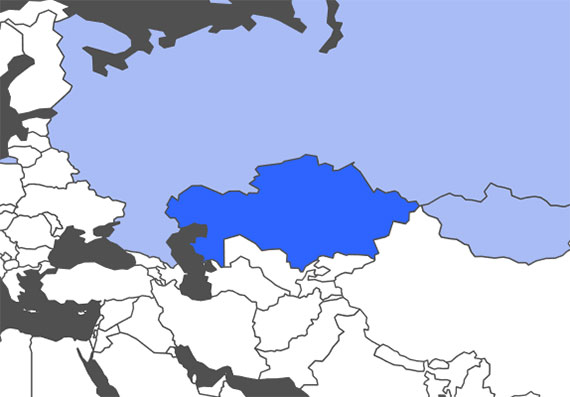The Department of Central Eurasian Studies (CEUS) at Indiana University offers courses in Kazakh language, and the culture, history, and society of Kazakhstan. Kazakh language classes are taught by professional and enthusiastic native speakers.
Kazakh Language Study in CEUS

Why learn Kazakh?
There are very few people in the United States who learn or speak Kazakh. Those who study Kazakh can find careers in a variety of fields including translation and interpreting, consulting, foreign service and intelligence, journalism, and many others.
Kazakhstan is the biggest country by landmass and the largest economy in Central Asia. It also has the second largest population and the most trade with the United States. Business partnerships with Kazakhstan and the U.S. are growing, creating a demand for educated Americans who are fluent in Kazakh. Kazakh is a gateway to accessing Turkic languages spoken by millions of people in the former Soviet Union, China, and the Caucasus, including the Tatar, Uzbek, and Uyghur peoples. These regions are of vital strategic importance in the world today.
The revival of the Kazakh language is an exciting story—and just by learning Kazakh, you become part of it. Kazakhs appreciate foreigners who take the time to learn their language and share their unique way of life.
Learning Kazakh is fun. The grammar of Kazakh is consistent and the spelling is phonetic. Learning Kazakh can be challenging, but remember what you won’t have to worry about: nouns don’t have gender, adjectives don’t have to agree with nouns, and verbs aren’t irregular! Best of all, by learning Kazakh you will get to know the Kazakh people, immerse yourself in their rich cultural heritage, and experience their way of life and the values they share.
IU Course Offerings:
Course offerings are made available in accordance with class level and student interest.
What is Kazakh?
Kazakhstan is the heart of nomadic Central Asia. For centuries, the cities of southern Kazakhstan participated in the cultural renaissance of the Silk Roads, while nomadic conquerors have repeatedly come out from the Kazakh steppes to build great empires. Kazakhstan was deeply influenced by the Mongol world empire, and many Kazakhs honor Genghis Khan as a national hero. Kazakh belongs to the Turkic group of languages, which includes languages such as Uzbek, Turkish, Uyghur, and Tatar. Turkic languages have been spoken across vast territory from the Balkans to China for many centuries.
Kazakh is an agglutinative language in which suffixes that indicate only one meaning are attached to the word stem one after another in a set order. Unlike some other Central Asian Turkic languages, Kazakh also has a vigorous system of vowel harmony in which the vowels of the suffixes change to fit the vowels in the stem. But Kazakh does not have the difficulties that inflecting languages have with grammatical gender and multiple systems of declension and conjugation.
Common phrases
Audio transcript:
Сәлеметсіз бе? Қалайсыз?
Hello! How are you?
Audio transcript:
не жаңалық? (не зат?)
What's new?
Audio transcript:
Сәттілік тілеймін!
Good luck!


